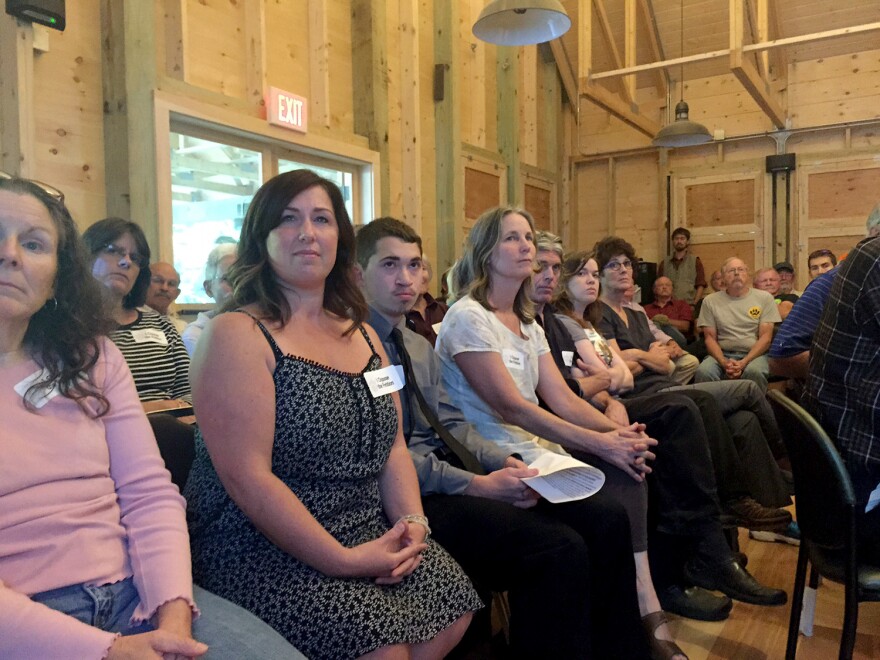A proposal to extend the trapping season for bobcat and otter in Vermont has galvanized a group of animal-welfare advocates who want to see the practice banned altogether.
Monthly meetings of the Vermont Fish and Wildlife Board don’t tend to draw overflow crowds. But last week, a controversial agenda item attracted more than 100 people to the Buck Lake Conservation Camp in Woodbury.
“I’m really glad to hear from everybody and to have everybody here, caring about something that’s important not only to the board members but to the staff at the Fish and Wildlife Department as well,” said commissioner of Fish and Wildlife Louis Porter, welcoming people to the meeting.
Of particular interest last Wednesday was a petition, filed by a Williamstown man, to extend the trapping seasons for bobcat and otter.
The proposal is fairly limited in scope, and according to Fish and Wildlife biologists, it wouldn’t yield more than a dozen or so additional kills annually.
Porter sought to assure attendees that the health of animal populations would be at the forefront of the department’s recommendations.
“My department folks and I and this board would never ever consider a change that we thought imperiled a population,” Porter said. “And my biologists would never propose such a thing, their managers would never authorize it, I would never forward it, and this board would never tolerate it.”
Porter’s assurances were of small comfort to a large portion of the crowd, many of whom wore “I Oppose the Petition” stickers on their shirts. The public comment period didn’t come until almost 9 p.m., four hours after the meeting began. And when people finally got to speak, it became evident that concerns extend far beyond the language in the petition.

Pat Monteferrante is the vice-president of a group called Protect Our Wildlife, an organization founded in Vermont in early 2015 that’s dedicated in part to banning the practice of trapping.
“When I hear someone say, ‘What’s a few extra animals?’, it makes my blood run cold,” Monteferrante says. “I don’t think that’s conservation, and I don’t think the people who say that are conservationists.”
It’s a charge trappers reject outright.
Wildlife biologists say the state’s bobcat population has grown since trapping was first allowed, in 1994. And they say the bobcat population is “stable and healthy.”
"My department folks and I and this board would never ever consider a change that we thought imperiled a population." - Louis Porter, Fish and Wildlife commissioner
Larry Martin is the Washington Court director of the Vermont Trappers Association, and he says his personal observations support the department’s assessment.
“I believe in my area that bobcat and the otter may be at the peak population for my lifetime,” Martin says.
The proposal has the unanimous support of the Vermont Trappers Association. Bruce Baroffio, the association’s president, says it makes sense to let otter season run through the end of beaver season, and to allow the bobcat season match up with the fisher season.
“Two weeks is not going to make a statistical difference at all, and it would simplify things a very lot,” Baroffio says.

Trappers say advances in technology in recent decades have yielded humane devices that limit animal suffering. But it was evident last Wednesday there’s a philosophical chasm at play. Here’s what Walden resident Yeshua Boyer had to say:
“Standing here before you, I wonder what sort of dystopian reality I live in, where instead of congratulating you on moving to abolish their inhumane slaughter, I am pleading with you to come to your senses and cede to our collective reality for what it is.”
Other people opposed to the petition said the department lacks the comprehensive data needed to move forward with a plan that would involve animals listed by the state as being of “greatest conservation need.”
Others, like veterinarian Peggy Larson, are simply opposed in principle to trapping.
“I listen to you people, and you talk about these animals like they’re commodities, like they’re sausage or a cabbage or something,” Larson said. “If you were doing this to dogs and cats, under Title 13 you would be facing a state’s attorney.”
"If you were doing this to dogs and cats, under Title 13 you would be facing a state's attorney." - Peggy Larson, veterinarian
The Department of Fish and Wildlife has recommended the board extend the otter season and, out of an “abundance of caution,” leave the bobcat season as is.
Brenna Galdenzi, president of Protect Our Wildlife, made it clear after the meeting that her group intends to do away with trapping seasons altogether.
“It’s inexcusable in this day and age that that’s still accepted,” Galdenzi said. “So I think this issue, this petition, will definitely help our larger cause of trapping reform, because it’s actually been a really galvanizing moment.”
The board has yet to issue even a preliminary decision on the trapping petition. And it’ll hold several public hearings before finalizing any proposals.
But board member Justin Lindholm cautioned his colleagues as they consider their options: Extend the season, Lindholm says, and the people behind Protect Our Wildlife might find some sympathetic ears in the Statehouse.
“As far as I’m concerned, I’m not going to kick that hornets’ nest. I’m not going for it. And I am not an anti-hunter, I’ll clue you in,” Lindholm said.
Anti-trapping activists have successfully banned bobcat trapping in New Hampshire and California.






